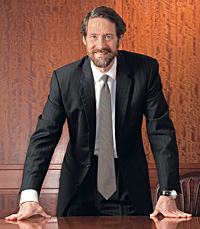| |
 |
| |
Let's
make a deal. Gary Parr has created a career out of bringing
parties together around the table.
Photo © David Neff |
| |
|
Theory
into practice
Analytical
and 'people' skills both key, says financial ace Gary Parr '80
By Matt
Golosinski
Investment
banking veteran Gary Parr '80 isn't losing sleep these
days, despite being at the center of some blockbuster deals
as deputy chairman for Lazard Freres & Co., the venerable
global financial advisory firm.
In
2004, for instance, Parr helped broker the $58 billion transaction
that merged the second-largest U.S. bank — JPMorgan
Chase — with the sixth-largest, Chicago-based Bank One.
The move stirred Wall Street and created an entity with some
$1 trillion in assets — second only to Citigroup in
size.
While
those numbers might cause some to blanch, Parr, 50, doesn't
blink.
"Does
it keep me awake at night? No," says the former co-head
of Morgan Stanley's mergers and acquisitions department. "I
might be awake at night —
because we're working," he adds with a laugh. "There
were some all-nighters to get that transaction done. But when
it's time to sleep, I sleep."
That's
because the Kellogg graduate is among the best at what he
does, having developed a rainmaker reputation over a 27-year
career that started with him handling insurance industry mergers
at First Boston. In 1988, Parr was part of a group of stars
that formed the advisory firm Wasserstein Perella, co-founded
by Joseph Perella and Bruce Wasserstein. (Today, Wasserstein
is Lazard's chairman and CEO). Parr moved to Morgan Stanley
in 1993, and among his roles oversaw its M&A division,
until Wasserstein recruited him to Lazard in 2003. He was
one of the standouts the firm assembled between 2002-2004
to bolster its merger advisory strength in advance of a May
2005 IPO.
"Gary
is one of the world's outstanding investment bankers with
a wealth of experience and strong client relationships,"
said Wasserstein in announcing the hire.
And
those relationships matter, Parr says.
"Relationships
are critically important in this business," he says,
recalling his longtime connection with JPMorgan CEO Jamie
Dimon, and another with Kellogg classmate Tom Wilson,
today CEO of Allstate. Other Kellogg peers have turned out
to be professional colleagues or clients. "This is a
network that has value," Parr says.
Expertise
also matters, especially since many deals fall apart before
they reach the finish line. Plus, some studies indicate that
more than half of all mergers fail. The ones that succeed
do so for many reasons, but fundamentally because of an underlying
strategic rationale, Parr says.
Even
when the strategy is sound, mergers demand superb implementation
to blend two cultures, he adds. Timing and larger market considerations
can still dictate the outcome, and many mergers also involve
more than the obvious numbers.
"My
job is not just about finance," Parr says. He points
out that in negotiating the deal there are often issues involving
various constituents, including employees and the local community.
"If
you have unhappy employees, that's going to show up in the
stock price," explains Parr, who has been involved in
several other recent transactions. He advised Mellon Bank
in its merger with Bank of New York and led the team that
advised the New York Stock Exchange in its 2006 reverse merger
with Archipelago Holdings, a historic move instrumental in
taking the NYSE public.
"There
is an energy associated with implementing an important merger,"
says Parr. "That still excites me. It's like solving
a puzzle in coming up with solutions to complex transactions."
Parr
credits the Kellogg School for providing some of the foundation
for his success. The MBA degree is "clearly valuable
for most people," he says. In addition to the value of
the network, the experience gives students a chance to mature.
It also provides exposure to "a breadth of disciplines
and learning that you won't get on any one job."
He
advises graduates to join the best company they can to get
exposure to senior industry leaders. "That's a big deal,"
Parr says. "I was very fortunate to be around some of
the best in the business, and I just learned."
|



